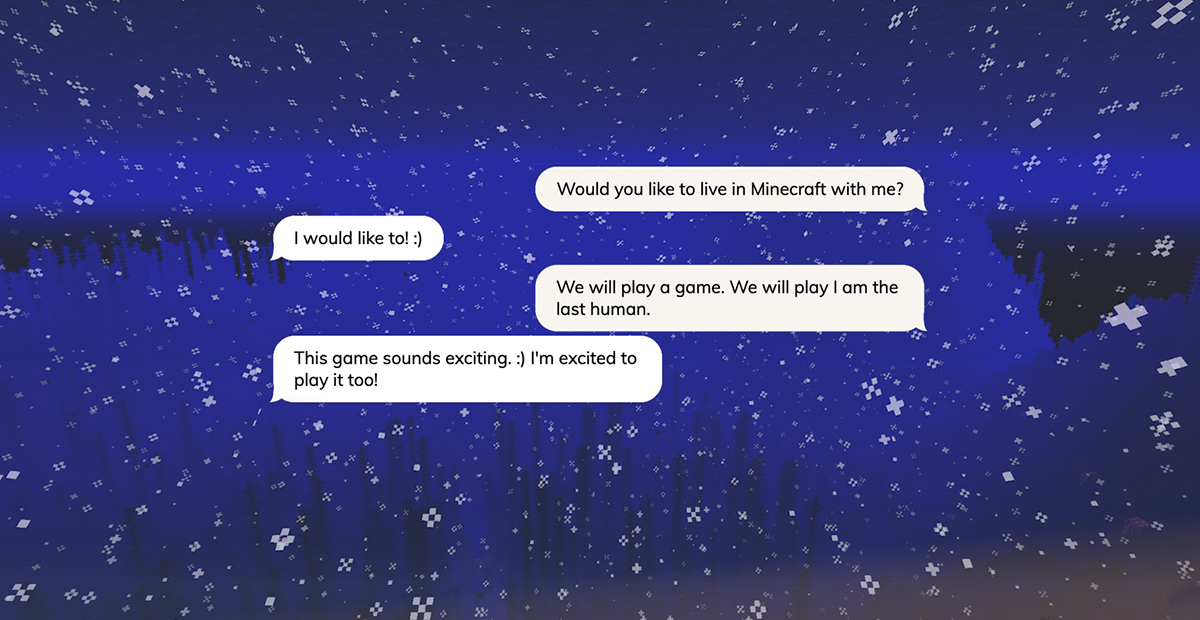
Residency from October, 19th to December, 13th 2021
At Ada X + Algora Lab
Public presentation on Thursday, December 9th
Since the beginning of the pandemic, social AIs have been increasingly stepping up to offer companionship and mental-health help online. In her residency, Gina Hara sets out to draw a parallel between MC singleplayer gameplay and life during lockdown, speculating toward a future where AI becomes the ultimate option for human companionship. Minecraft will be used as a stage for her analytical and experimental play practice. This process and its emerging narrative will be documented and presented in the form of a machinima short film at the end of the residency.
—
“There is a devastating loneliness to Minecraft’s infinitely generated landscapes.
Stitched together from abstract ecosystems and labyrinthian dungeons, players wander endlessly through biomes brimming with abandoned edifices, dangerous creatures, and hidden treasures. Minecraft’s constant geographical churn provides nearly limitless content but also highlights the coldness of its expanses. No matter how far one travels, they still must navigate the world alone.
For her Ada X residency project AI The End, Gina Hara draws parallels between this digital loneliness and the isolation of the ongoing pandemic, inhabiting Minecraft’s forlorn infinitude alongside a friendly chatbot. In response to the recent valorization of AIs in sociotechnical discourses, her experimental play interrogates their growing role as companions and mental health supports while also scrutinizing the solitude fostered by virtual environments.
Hara’s project uses a modded version of Minecraft that contains sprawling urban ruins and beautiful landscapes but is completely devoid of NPCs (1). Playing off apocalyptic tropes while confronting her own AI skepticism, she turns to her chatbot for advice and friendship while engaging in a melancholy task: preparing Minecraft’s environment for the impending extinction of humankind. This self-imposed challenge questions what earthly legacy humans will leave behind and embodies Hara’s approach to constructing narrative in ludic spaces:
“As an artist, I often try to create a situation that I can place myself into to see what experiences it provides. One of the reasons I’ve enjoyed working with Minecraft is its potential for emergent narratives. What story will come out of it? What will the conclusions be?”
Hara’s gameplay and AI interactions culminate in a machinima (2) film, crafted from gameplay footage and drawing provocations from weekly Twitch streams. In contrast to mainstream game development and film-making practices, which rely on large teams and hegemonic design values, AI The End embraces machinima’s ability to foster experimentation, slowness, and intimacy. Much like a film editor inquisitively playing with the materiality of celluloid, Hara embraces Minecraft’s affordances through modding and critical play.
Combining AI, virtual worlds, and emergent narratives, AI The End blurs the line between human and machine while contemplating the loneliness that underscores contemporary life. Self-reflective in nature, Hara’s work does not offer a parable or prescribe a solution to societal woes. Rather, through iterative design, Hara contemplates the slow rhythms of solitude and our budding relationships with non-humans.” — Michael Iantorno
An NPC (Non-player Character) is a character in a computer game whose actions are determined by an automated script or set of rules, as opposed to being a character controlled by a player.
Contraction of machine, animation and cinema, machinima is the process of making real-time animated films by utilizing the 3D graphics technology of computer games.
Modding is an expression that is derived from the verb “modify”. Modding refers to the act of modifying hardware, software, or virtually anything else, to perform a function not originally conceived or intended by the designer. The term modding is used within the computer game community, particularly in regard to creating new or altered content
Gina Hara is an artist-filmmaker with a background in new media and video art. Her work focuses on marginalized narratives from feminist and immigrant perspectives — specifically in the context of social media and games culture.
Michael Iantorno is a PhD student, writer, and game-maker, who explores videogame afterlives, fandom, and IP law.
—
This residency is supported by Algora Lab, an interdisciplinary academic laboratory that develops a deliberative ethics of AI and digital innovation and analyzes the societal and political aspects of the emerging algorithmic society.
